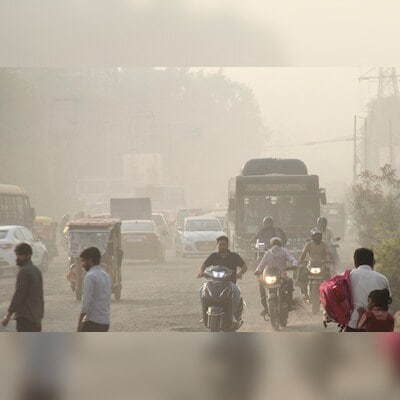Compared to WHO guidelines, average annual PM2.5 levels are six to seven times higher. | Representative photo: PTI
Three major cities in Karnataka – Bangalore, Mangaluru and Mysuru – have seen deterioration in air quality as pollution increases, according to a Greenpeace India report released on Saturday.
The report, ‘Spare the Air 2’, points to serious health concerns as average levels of PM 2.5 and PM10 are soaring in 10 major cities in southern India, significantly exceeding air quality guidelines set by the World Health Organisation (WHO).
PM2.5, or fine particulate matter, is a type of air pollution consisting of tiny particles 2.5 micrometers or less in diameter. PM10 is an air quality term for particulate matter 10 micrometers in size.
The report has analysed the air quality standards of Hyderabad, Chennai, Visakhapatnam, Kochi, Mangaluru, Amravati, Vijayawada, Visakhapatnam, Bengaluru, Mysuru and Puducherry.
The report’s lead researcher, Akanksha Singh, said: “Clean air is critical to our health, but this report reveals that particulate matter levels in all cities have exceeded the revised WHO guidelines. While current efforts are focused on cities that do not meet national ambient air quality standards, it is critical to also address cities that do meet them.
“Proactive management of air quality in these areas can help prevent them from falling into non-compliance with regulations.”
Compared to WHO guidelines, annual average PM2.5 levels are six to seven times higher in Hyderabad, Vijayawada, Kochi, Mangaluru, Amaravati and Chennai.
Furthermore, comparison of PM10 levels with WHO guidelines reveals that Bengaluru, Puducherry and Mysuru have annual averages that exceed these guidelines by four to five times.
“To address this, we continue to urge the Central Pollution Control Board (CPCB) to adopt a health-based approach while revising the National Ambient Air Quality Standards (NAAQS), striving to meet the latest scientific guidelines of the WHO,” said Selomi Garnaik, campaigner at Greenpeace India.
According to her, given the different pollution profiles and climatic conditions of southern cities, it is crucial to establish specific air quality standards for each region, aligned with local air basin management.
“This tailored approach will ensure more effective measures to manage air pollution and safeguard public health in these regions,” Garnaik added.
The report strongly advocates for the adoption of new NAAQ standards that take into account the unique pollution profiles and climatic conditions of southern Indian cities. It also recommends increasing investment in developing a hybrid air quality monitoring network that would facilitate real-time public access to air quality information.
It further suggests that local governments should promote renewable energy solutions while mapping sectoral hotspots to develop specific action points for effective pollution control, as well as create awareness programs to encourage people to adopt sustainable practices such as public transportation, electric vehicles and solar energy to reduce dependence on fossil fuels.
Avinash Chanchal, Campaign Director at Greenpeace India, said: “The report’s findings debunk the myth that southern states have cleaner air. This report should serve as a wake-up call for city governments in the south. It is imperative to adopt a comprehensive, long-term strategy to improve air quality, addressing key persistent contributors such as emissions from vehicles, power plants, industry, waste, construction and other sectors.
(Only the headline and image of this report may have been reworked by Business Standard staff; the rest of the content is auto-generated from a syndicated feed.)
First published: September 7, 2024 | 22:24 IS
Disclaimer:
The information contained in this post is for general information purposes only. We make no representations or warranties of any kind, express or implied, about the completeness, accuracy, reliability, suitability or availability with respect to the website or the information, products, services, or related graphics contained on the post for any purpose.
We respect the intellectual property rights of content creators. If you are the owner of any material featured on our website and have concerns about its use, please contact us. We are committed to addressing any copyright issues promptly and will remove any material within 2 days of receiving a request from the rightful owner.

